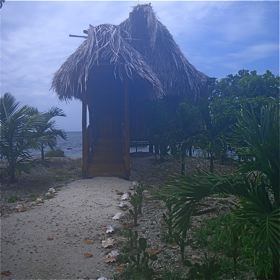 It was 3 a.m. Pitch black. Dragging my feet through dark mushy sand, I prayed not to twist an ankle.
It was 3 a.m. Pitch black. Dragging my feet through dark mushy sand, I prayed not to twist an ankle.
I was itchy. I was bleeding. I was aching and bone tired.
I had over 150 mosquito bites and just one thought: “What have these #*%! turtles ever done for me?”
So much for being a do-gooder.
I was on a remote beach in Costa Rica working with i-to-i, which arranges volunteer experiences with local organizations around the world. Leatherback turtles are an endangered species whose eggs are delicious to a host of predators, including humans. My job, along with a handful of other volunteers, was to prowl the beach in the middle of the night with no bug spray and no light (both are harmful or bothersome to the turtles).
We weren’t just looking for poachers, but also helping the Leatherbacks, who sometimes aren’t so skilled at building their own nests.
 Measured against the misery of mosquitoes, I found myself favoring natural selection. “Somebody has to help these turtles,” I reasoned. “But it’s going to have to be someone else.”
Measured against the misery of mosquitoes, I found myself favoring natural selection. “Somebody has to help these turtles,” I reasoned. “But it’s going to have to be someone else.”
I’d always thought of myself as a charitable person. Helpful to seniors, kind to animals.
Though it’s been many years since I’ve donned the sash, I’m still somewhat of a Girl Scout at heart. But volunteer tourism can push one to explore their limits. I found out that there’s a limit to what I’ll do for turtles.
Voluntourism is a worthy concept. Instead of “taking” a vacation, you give of yourself. Ecological conservation, construction, social services, teaching, medical aid—there are thousands of volunteer opportunities.
Most voluntourists have a much better time of it than I did. Each year, an estimated 100,000 people take a trip dedicated to organized volunteer work. In a U.S. Travel Association study, about one quarter of the travelers surveyed expressed an interest in service-oriented vacations. Voluntourists come from all over the world, brought together by a desire to lend their help for a cause. Like me, many are drawn by the idea of doing valuable work during vacation, trading the office for a more beautiful setting.
There are a lot of great reasons to become a voluntourist, beyond the obvious karmic benefits: It’s an awesome way to meet interesting people, both locals and other volunteers; there’s a closeness to the culture that you could never know through typical travel; there’s the opportunity to learn new skills, and maybe even get some exercise; and in some cases, you can offset your carbon footprint, at least a little.
 Part of the Girl Scout promise is to “be useful and help others.” I just wish I’d paid more attention to the Boy Scout Motto: “Be Prepared.”
Part of the Girl Scout promise is to “be useful and help others.” I just wish I’d paid more attention to the Boy Scout Motto: “Be Prepared.”
Voluntourism can be a meaningful, enriching experience. But you need to be ready for it. Here are some ways to ensure that you’ll have a better trip:
- Remember, above all, that it is volunteer work. The people who organize these projects are looking for help and counting on your service. Expect to work five or six full days per week. You’ll probably have weekends off to enjoy the area. But if you’re looking to sweep a few floors and then spend the rest of the day sightseeing, this may not be the trip for you.
- Think hard about the kind of work you’d like to do. Construction may sound like a great way to get in shape. But are you up for digging trenches? Those children on the Web site look awfully cute. But many have serious problems. Can you deal with that? And saving turtles? Well, do you like them enough to become a mosquito banquet?
- Get as much information as you can beforehand. Talk with someone who has worked on the same project. A good voluntourism organizer should be glad to give you references. You’ll hear how wonderful their trip was, but be sure to ask about the problems, too. Take time to read about the place, its politics and culture. In other words, know where you’re going.
- Once you decide what kind of work you want to do and where you’d like to do it, you’ll find a big selection of groups promoting trips. For example, www.flyforgood.com is an excellent resource of general information, and will link you to a wide variety of volunteer organizations. Certain volunteer projects will qualify you to receive reduced airfare, so be sure to check out www.humanitarianairfare.com. For a good overview of voluntourism from an industry insider’s perspective, check out www.voluntourismgal.wordpress.com.
- The sponsoring organization will give you a packing list. Be sure to talk to a coordinator who has actually worked on the project to give you an even better idea of what you’ll need. Ask what was useful, and what they wish they’d brought.
 Try to pack as light as possible, but also read between the lines of your packing list. If it says to bring a mosquito net, Calamine lotion is implied. (This would have made all the difference in my trip!) Doing heavy work or visiting a cool climate? If you have access to electricity, a heating pad may be your best friend. Sunblock can never be too high a number. A set of work gloves will save your hands.
Try to pack as light as possible, but also read between the lines of your packing list. If it says to bring a mosquito net, Calamine lotion is implied. (This would have made all the difference in my trip!) Doing heavy work or visiting a cool climate? If you have access to electricity, a heating pad may be your best friend. Sunblock can never be too high a number. A set of work gloves will save your hands.- Packing list aside, bring a comb, but do your best to forget about how you look. Avoid mirrors like a vampire. When cameras come out, just throw on sunglasses and pretend you look chic.
- Above all, be prepared to adapt to a different way of life. Showers, if available, may be cold and shared with bugs. The food will most likely be different, and your meals may bear no resemblance to the local cuisine described in tourist guides.
- Understand that you are a guest visiting a different culture. Men and women may have more prescribed roles. Err on the side of dressing too conservatively.
- You may need to re-set your internal clock, not only to a different time zone, but a whole different schedule, and perhaps a slower pace. Enjoy it.
- Be prepared for re-entry. You’ve just had an experience that will forever alter the way you see the world and yourself. Your home may now seem like a palace, your hot shower like the finest of spas. If you have wounds, nurse them, remembering that whatever doesn’t kill you makes for an excellent story later.
- Be humble about your experiences. When your friends brag about their vacation drinking margaritas on beach, resist the urge to ask if they saw any giant sea turtles.
By Julie Manis for PeterGreenberg.com. Visit Julie on the Web at Statscustom.com for fine custom-made shirts and JoyofBreathing.com to learn about her techniques on stress coaching.
Learn more about traveling in Mexico & Central America:












